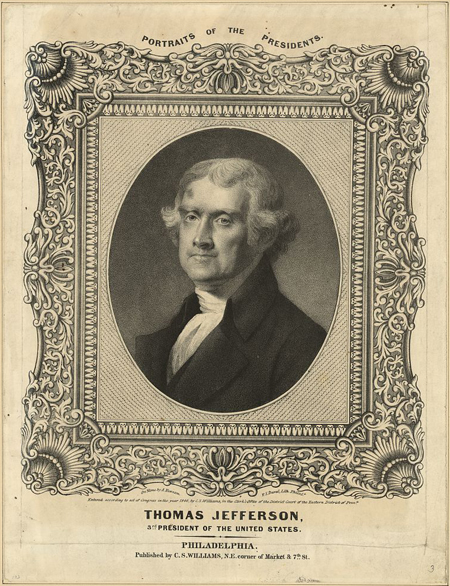Today in History: Thomas Jefferson Elected
Today in History–February 17–the Library of Congress features Thomas Jefferson, who was elected by the House of Representatives on this day in 1801. The House voted to break a tie in the Electoral College. Find out more about this acrimonious third presidential election by visiting the Today in History section, then follow the links below to access more primary sources and resources about this election and the 3rd president of the United States.
Individual primary sources
- Thoughts, on the subject of the ensuing election, addressed to the party in the state of New-York, who claim exclusively the appellation of federalists … April 1, 1800
- An address, to the voters for electors of President and Vice President of the United States in the State of Virginia … The American Republic ticket. [List of electors with districts] Richmond, 26th May, 1800
- Richmond, August 9th, 1800. Sir. We have taken the liberty to advise you, to have the tickets for electors of President and Vice-president of the United States written
- Thomas Jefferson to Aaron Burr, December 15, 1800, “I understand several of the high-flying federalists have expressed their hope that the two republican tickets may be equal, & their determination in that case to prevent a choice by the H of R…”
- Thomas Jefferson to James Madison, December 19, 1800, “But I hold the latter impossible, and the former not probable; and that there will be an absolute parity between the two republican candidates.”
- Thomas Jefferson to James Madison, December 26, 1800, “All the votes have now come in, except of Vermont & Kentuckey, and there is no doubt that the result is a perfect parity between the two republican characters.”
- Thomas Jefferson to Tench Coxe, December 31, 1800, “The contrivance in the Constitution for marking the votes works badly, because it does not enounce precisely the true expression of the public will.”
- James Madison to Thomas Jefferson, January 10, 1801, “I find that the vote of Kentucky establishes the tie between the Repub: characters, and consequently throws the result into the hands of the H. of R.”
- Thomas Jefferson to Aaron Burr, February 1, 1801, “It was to be expected that the enemy would endeavor to sow tares between us, that they might divide us and our friends. Every consideration satisfies me you will be on your guard against this, as I assure you I am strongly.”
- Thomas Jefferson to James Madison, February 1, 1801, “I dare not through the channel of the post hazard a word to you on the subject of the election. Indeed the interception and publication of my letters exposes the republican cause as well as myself personally to so much obloquy [public criticism] that I have come to a resolution never to write another sentence of politics in a letter.”
- Thomas Jefferson to Tench Coxe, February 11, 1801, “This is the morning of the election by the H of R.”
- Thomas Jefferson to Benjamin Smith Barton, February 14, 1801, “This is the fourth day of the ballot, and nothing done…”
- James Bayard to Allen McLane, February 17, 1801, “Mr. Jefferson is our President.”
- Thomas Jefferson elected president on the thirty-sixth ballot, Annals of Congress, House of Representatives, February 17, 1801
- Thomas Jefferson to James Madison, February 18, 1801, “The minority in the H of R, after seeing the impossibility of electing B…”
- Election of President, Annals of Congress, House of Representatives, February 11 to February 18, 1801.
- Resolution notifying Aaron Burr of his election as vice president, Annals of Congress, Senate, February 18, 1801.
- Thomas Jefferson to Thomas Mann Randolph, Jr., February 19, 1801, “After exactly a week’s balloting there at length appeared 10. States for me, 4. for Burr, & 2. voted blanks.”
- James Madison to Thomas Jefferson, February 28, 1801, “The result of the contest in the H. of R. was generally looked for in this quarter.”
Primary source sets

